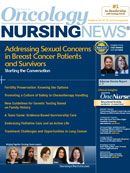Palliative Care Is a Priority-Nationally and Worldwide
Palliative care is the new buzzword in the hospital environment.
Helen Foley, MSN, RN, AOCNS
Helen Foley is a member of the Clinical Faculty at the Frances Payne Bolton School of Nursing at Case Western Reserve University and a Clinical Nurse Specialist at UH Seidman Cancer Center, in Cleveland, Ohio.
Palliative care is the new buzzword in the hospital environment. Does your hospital offer palliative care to patients? Do you have a special service to help with transition in goals discussions, managing bothersome symptoms, titrating pain meds, and helping families?
Oncology nurses have long been interested in providing palliative care as part of their everyday practice. Physicians have recently been turned on to the value of palliative care, in part due to Jennifer Temel’s landmark finding that lung cancer patients live longer if they are given palliative care early in their treatment.1
The World Health Organization has promoted palliative care as an essential component—not only of end of life care, but also of care for any patient and family facing a life-threatening illness.2
Part of Every Nurse’s Practice
Faculty at the Frances Payne Bolton School of Nursing at Case Western Reserve University (CWRU) recognize the importance of integrating palliative care practice throughout the curriculum. Palliative care skills should be part of every nurse’s practice. A recent New York Times article reminded us that Florence Nightingale was a scientist, microbiologist, and sanitation engineer.3 She was also the first real palliative care nurse. What she had to offer patients in the mid-1800s was comfort, cleanliness, and psychosocial support. Her work, and the work of many who followed her, formed the basis of our profession.
Nurses are educated early on to provide physical, psychosocial, and spiritual support for our patients. Our one dependent function, carrying out physician’s orders, is just that—our only dependent function.
Everything else we do for the patient is part of our independent practice, and most of that practice falls into the realm of palliative care. Thus, nurses are early practitioners of palliative care when they graduate from nursing school. Unfortunately, those palliative care skills can sometimes get short shrift when the one dependent function looms large on a busy unit.
Fortunately, oncology nurses often identify their palliative care practice as the most rewarding part of their work with patients. Many oncology nurses seek out opportunities to develop their palliative care expertise—sharpening their palliative care skills to provide comfort and psychological support to their patients and families and represent the interests of their patients in the complex medical system.
Several years ago, Polly Mazanec, PhD, and Carol Kelly, PhD, brought the ELNEC (End of Life Nursing Education Curriculum)4 to CWRU. Faculty have made completion of the ELNEC program a requirement for all of our prelicensure and MSN students as a way of ensuring that all students possess palliative care skills, no matter which clinical specialty or care setting they end up pursuing.
In addition, Mazanec and Barbara Daly, PhD, RN, FAAN, started an MSN Nurse Practitioner program which has an emphasis on oncology and palliative care. Graduates from this program have specialty training in palliative care, in addition to meeting requirements for the Adult/Gerontology Nurse Practitioner program.
Extending the Reach
Through our program, national and international students come together to sharpen their skills in both oncology and palliative care, and Daly’s receipt of a $1.76 million grant to train pre- and postdoctoral students in palliative care research ensures that nurses will continue to advance the science in palliative care.
International students come to our institution with a strong interest in learning more about palliative care and oncology.
Fatmah Alsharif graduated from King Abdul Aziz University in Saudi Arabia and was hired to teach in their nursing program. The university sent her to CWRU to pursue specialty training. Alsharif identifies palliative care skills as a needed area of expertise in her university and country. She has been working towards adapting the ELNEC curriculum to the Saudi Arabian culture, so that she may ultimately take that special programming to her country.
Norman Carl Swart was hired in 2010 to develop a program in oncology and palliative care for the University of Botswana where he received both a BSN and MNS. He came to CWRU in 2011 to pursue his MSN, and has continued on in the PhD program. His clinical interests are primary healthcare with a focus on cancer and palliative care including HIV. He has recently been part of a research team trying to learn more about the palliative care needs of cancer patients in Botswana and is eager to take home his new expertise in palliative care to teach fellow nurses and to help in the care of oncology patients.
References
- Temel J, Greer J, Muzikansky A, et al. Early palliative care for patients with metastatic non-small-cell lung cancer. N Engl J Med. 2010;363(8):733- 742.
- World Health Organization. WHO Definition of Palliative Care. http:// www.who.int/cancer/palliative/definition/en. Accessed March 17, 2014.
- Sweet V. Far more than a lady with a lamp. The New York Times. March 4, 2014: D3.
- American Association of Colleges of Nursing. End-of-Life Nursing Education Consortium (ELNEC) Fact Sheet. http://www.aacn.nche.edu/elnec/ about/fact-sheet. Accessed on March 17, 2014.

Innovative Program Reduces Nurse Turnover and Fosters Development
Published: September 12th 2024 | Updated: September 12th 2024The US Oncology Network (The Network) has developed one of the most comprehensive programs in the nation to support the professional development and retention of new oncology nurses.


